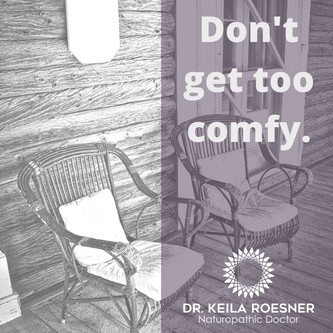 On average, how many hours a day do you spend sitting, uninterrupted? One hour? Two hours? Three…or more? Our ancient ancestors spent much of their time on the move, hunting and gathering to serve their basic needs, as well as more play and family time. Obviously, the balance between movement and fuel has shifted dramatically over time, most notably since the technological revolution. Unlike our ancestors, we no longer search for food. Instead, we are now on a quest for time, as hours fly by while we’re hunched over a keyboard. On an average day, many of us are likely sitting more than we are moving and consuming more calories than we are burning. Many of us regularly put in eight-hour workdays seated at a desk – sometimes even more. We get headaches and neck tension and need to see our massage therapist more often. We then go home and unwind on the couch, binge-watching our favourite shows. The hours begin to add up. Maybe we make a little time to fit in some exercise each day; however, with more conveniences at our fingertips, we can do a lot more while moving a lot less. The longer we sit, the more our bodies begin to feel tight, tired and sore. It’s clear that too much sitting isn’t good for us. But did you know that it can even lead to earlier mortality? Sitting and Premature Death That’s right…too much sitting can kill you! In fact, some are saying that “sitting is the new smoking” because its impact is so significant. According to recent research from the Journal of the American Heart Association, prolonged sitting presents similar health risks as smoking, such as heart disease, lung cancer, and diabetes. It also increases premature death by about 50 percent! Even more surprising, too much sitting increases your risk for an early death regardless of your fitness level or other lifestyle habits. You simply cannot undo hours of sitting with a 20 minute walk (although you should still keeping walking). But sitting isn’t just bad for your heart or metabolism; it is also bad for your brain! Researchers at the University of California have discovered a connection between sedentary behaviour and thinning regions in the brain that is critical to new memory formation. So, what if your job requires you to be at a desk, all day, every day? Are you supposed to quit? Well, of course, that’s not practical. However, there are a few simple things you can do to ensure that you keep your body regularly moving for a longer, healthier life. Tips to Sit Less & Live Longer
Do you spend excessive amounts of time sitting? Do you experience any health problems that you think could be related to a sedentary lifestyle? Let’s chat and get to the root of your health issues. Book an appointment with our clinic, and together we will find ways to improve your overall health and well-being so that you can live your life to its fullest. Call 519-275-2187 ext. 7 or Book Online to get started. In health, Dr. Keila Roesner BHSc ND
References:
0 Comments
 Conquer the common cold like a boss. Conquer the common cold like a boss. The common cold: It happens to the best of us...but what if you could prevent it? Whether you pick it up from your kids at daycare or there’s something going around the office it might seem inevitable to catch a cold once a year… or more. Maybe not. The common cold is used to describe a cluster of typical symptoms - sneezing, sinus congestion, runny nose, sore throat, and headaches – but can actually be caused by more than 35 different viral strains. And each of these strains can adapt and mutate. So yes, there is ALWAYS something going around. The question is: are you vulnerable? While we commonly think of October-March as “cold and flu season”, I tend to disagree. Yes, viruses are more common during this time. On the other hand, we are also busier and more stressed. Between Halloween, Thanksgiving, Christmas/Hannukah/Kwanza, New Years, Valentines Day and Easter sugar consumption is at an all time high. Most Canadians are deficient in Vitamin D – a potent immune support – unless we are also snow birds. We spend a lot more time indoors, breathing recycled air. So while colds are more common, we also have the odds stacked against us and our bodies aren’t always able to ward off viruses and bugs. The trick is building up your body’s resistance – since coming across the cold is inevitable – so that you are better able to withstand or bounce back quicker. 1. Eat more colorful vegetables. Different colors of vegetables offer different vitamins, antioxidants and healing properties so it’s a great idea to change up what you are eating. Almost all of us could stand to eat more too. Aim for 7 + servings per day. One serving is 2 handfuls of greens or 1 cup of other veggies. 2. Reduce exposure. Wash your hands with regular soap and water. Unless you are required to use hand sanitizer skip antibacterial hand soaps and sanitizers as many contain an ingredient called triclosan that is a known hormone disrupter. While we can’t always avoid exposure, keep your distance from people that are sick. Bring your own pen to the bank, keep tissues handy and wipe down common area surfaces with soap and water. 3. Go to bed. Getting enough sleep throughout the year is crucial. If you do get sick, stay home and rest to avoid infecting others. Unless you absolutely have to be somewhere, skip over-the-counter decongestants that contain acetaminophen… they are incredibly dehydrating. Your best bet is NOT pushing through the cold, but allowing your body the down time that it needs. While you’re at it, trying Magic Socks. 4. Drink lots of fluids. Ginger tea is one of my favorites, and plain water hot or cold is essential. Sneezing and coughing are incredibly dehydrating! Keep a humidifier in your bedroom also. 5. Make an individualized plan. Every year I run an Immune Booster program with my clients to keep them in tip top shape throughout the season. I find that a combination of herbals, homeopathics and vitamins customized to their needs, along with the above treatments, has been incredibly effective for reducing the risk of colds & flu and in the event that they do get sick, it is much less severe and passes quickly. What are your favorite go-to treatments to get over a cold? Comment below! If you found this article interesting please share. Looking to prevent the cold like a boss? Book an Immune Support visit with me to get started. References:
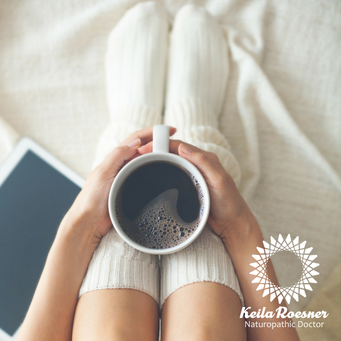 Let’s face it: having a cold sucks. You know you’re going to be out of the game – or at least not at your best – for a few days. Having cold and kids – or kids with colds – is even worse. Contrary to popular belief, over-the-counter products marketed to help you push through the day are NOT the best way to get over a cold. While they can be helpful if you absolutely cannot miss a day, they do nothing to support your immune system. If you’ve been burning the candle at both ends, it’s not unusual for your body to take a little hit and become vulnerable to whatever virus is going around. The best cold & flu prevention is keeping your body in good shape so that your defenses don’t go down. In the event that you do find yourself under the weather, here’s one of my favorite ways to reduce congestion and support the immune system. I have consistently found that this helps reduce recovery time and helps me feel a lot more human. What is it? Magic Socks. Because they work so beautifully in kids, are safe, easy and inexpensive. I do this at the first sign of a cold, and recommend it to my patients as well. You need:
Here’s what you do:
Your socks should be completely dry by the morning with warm feet. Repeat for 2-3 nights to decrease sinus congestion and help you sleep. Now of course, you want to make sure that your feet are warm before starting the treatment, to avoid getting a chill. You will also want to do this as a part of your Naturopathic cold treatment program and work with your health care provider to make sure that you are recovering well and not dealing with a more serious health concern. As always, use your best judgement. Want to really reduce your risk of getting sick? Sign up for my natural Cold & Flu Prevention program. In health, Dr. Keila Roesner BHSc ND Reference: “Lectures in Naturopathic Hydrotherapy” by Wade Boyle, N.D & Andre Saine, N.D. Eclectic Medical Publications, Sandy Oregon 1988.
 There's a burning fiery pit in your chest. It's not a heart attack. You've checked with your doctor before. It's feels heavy, uncomfortable and burns. At your last visit you were told that you probable have GERD. And you think, "what a goofy name for something that feels like hell!" Heartburn, or Gastroesophageal Reflux Disease (GERD) accounts for one out of three primary care visits, and has been increasing quite dramatically over the last two decades (1). It's now estimated that 18-27% of adults in North America experience heartburn at least once weekly (2), and many experience it daily. Which absolutely sucks. This sharp increase can be attributed to rising rates of obesity, and is more common amoungst smokers and with age. Common symptoms of GERD include:
A diagnosis of GERD is often made at the physicians office, and then commonly, anatacids (Gavison, Rolaids, Tums), H-2 receptor blockers (Pepcid AC, Zantac) or Proton pump inhibitors (PPIs, like Prevacid, Losec etc.) are recommended to "stop the burning". If it helps, it is assumed that GERD was your problem. But we seem to have gotten a little caught up with this idea that burning = too much acid. If you've read my blog "Why Does My Stomach Hurt?" you'll see that it is a little more complicated than that. Heartburn typically stems from one of four causes:
Very rarely have I ever seen increased stomach acid cause heartburn. Rather, it is most likely a combination of low stomach acid, over-eating and a weak lower esophageal sphincter. Zollinger-Eillison Syndrome is the only known cause of increased stomach acid, and is a very rare condition where one or more tumours in the small intestine or pancreas (gastrinomas) secrete a large amount of the hormone gastrin which then causes the stomach to produce too much acid (5). In summary, your stomach is probably not too acidic. But something else is going on, making your uncomfortable. Don't you want to find out.. and fix it? If you or someone you love is experiencing heartburn and want to treat the cause, please book a Free 15 Minute Health Discovery Session with me. In our next few blogs, I will outline how to know if GERD is part of a larger puzzle and how you can start improving it naturally. Until then, happy digesting! References:
 "My stomach hurts all the time", lamented my third client. That is, my 3rd client today alone. She continued, "I'm bloated all the time, even with healthy food. I'm constipated, then I have loose stool. I never feel like I'm getting everything out!". I also work with her father, who has heartburn, a "noisy gut" and suffers from urgent abdominal pain any time he has to go outside of the house. 2 out of 3 clients I work with have digestive issues. As long as I can remember, I have had abdominal pain while eating dinner. My immediate family all suffer from Irritable Bowel Syndrome ("Ass Crisis", as we've affectionately deemed it). I have had a vested interest in learning and working with the digestive system from the day I saw my first client. Fortunately, I have found that most "gut problems" respond extremely well to Naturopathic medicine. If you, or someone you love, has been suffering, this post is for you. The Digestive System - more than just your stomach The digestive system encompasses everything from your mouth down until you see it in the toilet (hopefully) the next day. The Head Digestion starts in the brain, evoking a physical response long before food passes your lips. When we think about food, envisioning how it will taste and feel and actually let ourselves feel hungry, our body gets to work increasing saliva, stomach acid and digestive enzymes. Like a good seduction, digestion is as much a head game as the act of doing it. Problem Zone 1: eating mindlessly, not letting yourself get hungry, eating in a rush, over-eating etc. so that your body doesn't have time to catch up The Mouth Chewing your food thoroughly accomplishes two things:
Problem Zone 2: eating without thoroughly chewing, drinking large amounts of fluids with meals that may dilute your digestive enzymes The Esophagus The esophagus is a flexible tube that carries food from your mouth to your stomach. At the bottom of the esophagus/top of the stomach is a muscle called the lower esophageal sphincter or the cardiac sphincter. When it opens it allows food from the esophagus in the stomach, otherwise it should stay shut to prevent splash up of acid causing heartburn. Problem Zone 3: eating too quickly so that food gets stuck or the stomach becomes overloaded; heartburn that creates pain in the esophagus The Stomach In the stomach, hydrochloric acid (HCl) is produced by the parietal cells in the stomach. Another enzyme called pepsin begins to work on the food as well, breaking down protein. An acidic environment is required to breakdown our food and prevent pathogens (bacteria, fungi, parasites and other food borne illnesses) from taking hold. After churning in the stomach, the partially digested food (now called chyme) moves past the pyloric sphincter at the base of the stomach and empties into the upper small intestine. Problem Zone 4: inadequate stomach acid causing poor digestion of food, heartburn and increasing risk of illness, ulcers Liver/Gallbladder/Pancreas As food enters the upper portion of the small intestine, it passes nearby to the liver, gallbladder and pancreas, which all make enzymes to help us digest fats, proteins and carbohydrates (lipase, protease, amylase and others like lactase for digesting lactose, renin, sucrase etc.). This will result in further breakdown of our food. Problem Zone 5: inadequate fat in diet to stimulate production of lipase and bile, not enough protein in diet to make these enzymes, blood sugar issues that compromise the pancreas' ability to manufacture amylase and keep blood sugar in check, poor functioning of the liver and gallbladder The Small Intestine The small intestine has three parts: the duodenum, jejenum and ileum and collectively is about 6 meters (20 feet) long in humans. As it passes through each of these, food interacts with the lining of the intestines, is absorbed and utilized by the rest of the body. Nutrients from our food are absorbed along the small intestine and breakdown continues. Problem Zone 6: food sensitivities create inflammation along the lining of the small intestine resulting in poor digestion and impaired absorption of nutrients. These can create very dramatic digestive symptoms, and malnutrition. Colon Issues The mostly digested food enters the large intestine, where water is reabsorbed back into the body along much of its 1.5 meters (5 feet). Different kinds of bacteria work on breaking down the remnants here. Problem Zone 7: poor bacteria in the colon can cause bloating, gas, distention and pain. Rectal Issues Finally, stool exits the body. Stool is mainly water, combined with food remnants, dead bacteria and cellular waste. If there is inflammation here or in the colon, the remaining material may not be broken down properly. Problem Zone 8: Hemorrhoids and anal fissures (small cracks around the anus) can block the passage of stool and create pain, bleeding and tearing of the delicate tissue. Putting It All Together (The Digestive Dream!): Top 10 Tips to Hack YOUR Digestive System:
If you experience gas, bloating, heartburn, diarrhea, constipation or other digestive concerns and are interested in learning more, please schedule your Free 15 Minute Health Discovery Session with me. In health & happy digestion,  If you’re going to cook up a satisfying sex life, you need the right high quality ingredients, in the right amounts... and hold the stress. Likewise, when our body produces our main sex hormones, testosterone, estrogen and progesterone, we need some basic ingredients available in the kitchen, which in this case is our liver, ovaries (testes in men) and adrenal glands. We need enough of all of these in order to have a healthy libido and enjoy sex. And sex is a great way to relieve stress. Cholesterol is the main building block of many hormones, including our sex hormones and the stress hormone, cortisol. When we restrict fat, our body will upregulate the production of cholesterol by the liver to ensure that you have the raw materials available. During production, cholesterol is modified several times. Eventually, the raw materials come to a fork in the road, where the body can either continue on to manufacture our sex hormones, or switch over to making cortisol. Both of these directions are essential to a healthily functioning body and ideally, a balanced ratio is maintained. In our fast-paced, over-booked lives many of us produce excess cortisol in order to keep up. Cortisol, taking one path, competes for the same binding sites in the body as progesterone which is the precursor to our other sex hormones. Symptoms of excess cortisol include weight gain around the middle, feeling tired and wired, poor sleep, irregular menses, blood sugar dysfunction, muscle fatigue, poor stress response long term... and low sex drive (because who has the time to get it on with that huge to-do list?). Furthermore, we are likely to experience abnormal production of progesterone, estrogen and testosterone because the raw ingredients are not available in the right quantities. Just like trying to make a recipe when you are short on groceries, the end result can get interesting. Often, we will experience a combination of excess and deficient hormone levels which will typically affect our resistance to stress, metabolism, thyroid function, digestion and sexual function. Again, our libido can suffer. And just like learning to cook requires time spent cooking, when we are stressed, our libido tends to suffer yet having sex can be one of the best things you can do to relieve that stress! In order to balance these complex hormones, stress management is essential as is eating well and exercising. The goal is to have enough ingredients to produce these hormones in the right amounts, so that we have enough energy, healthy libidos and can age well. In other words, we need to have a clean, organized and well stocked kitchen, a good recipe and enough time to cook. Here's what you can do:
If you're suffering from low libido, a Naturopathic Doctor trained in the use of bioidentical hormones can help you to test your hormones and create an individualized treatment plan to ensure that you live a healthy, happy balanced life… and a great sex life. You can also check your hormone score to see if you might have some imbalances. Want to go further? Book your free 15 minute health strategy session to learn more about balancing your hormones (and improving your sex life).. naturally. In health, Dr. Keila  http://cdn.vogue.com.au/media/articles/7/2/0/7267-1_n.jpg?150136 http://cdn.vogue.com.au/media/articles/7/2/0/7267-1_n.jpg?150136 Irritable Bowel Syndrome (IBS) affects people of all ages, however females, and young adults are most likely to be diagnosed. Symptoms can range from cramping, bloating, diarrhea, constipation, incomplete voiding, mucous, nausea and heartburn. Canada and other more well-off countries tend to have much higher rates of IBS, representing a major quality of life burden. While many people are told that they have IBS (and that's that), they might not realize that there's more to it than a bathroom crisis. 1. IBS is not a diagnosis, it is a catch-all. In medicine, we call this a diagnosis of exclusion. This means that before IBS is diagnosed, we need to rule out more serious pathology like Ulcerative Colitis, Crohn's Disease, Colorectal Cancer, Celiac Disease and other immune related conditions. If you are suddenly experiencing a change in bowel patterns, including mucous or blood in your stool, have unexplained weight loss, fever and family history of colon cancer, this merits a thorough medical workup. In the absence of these things, IBS is considered a functional disorder, wherein you experience the symptoms (which can sometimes be very severe) but very little can be seen via labwork or exploratory imaging. 2. Irritable bowel syndrome can include constipation, diarrhea or both. The Rome-III Criteria are used to identify most cases of IBS. This includes recurrent abdominal pain or discomfort at least 3 days per month in the last 3 months, associated with 2 or more of the following:
3. You are what you eat - and what you eat matters! Many people with IBS know one or two foods that set them off, and are careful to avoid it. What you may not know is that your body might actually be having a full-on immune reaction to some of the foods you eat on a regular basis - causing the digestive upset and bathroom angst. Food sensitivities are quite common amoungst people with IBS and it is worth doing a trial elimination diet where you remove the typical offending foods such as gluten, dairy, eggs, soy, citrus, and pork for a period of time and then slowly reintroduce them back into your diet. There are tests to help determine which foods your body is reacting to as well - and these can be quite effective and simple to run. Processed foods, particularly those containing a lot of trans fats, sugars, salts and additives like MSG are the culprit for many people. A diet focused on lots of cooked vegetables, good quality lean protein and some healthy fats like coconut oil, ghee and olive oil can help decrease the severity of IBS. Likewise, a history of multiple rounds of antibiotics can predispose towards IBS as your own natural bacteria gets altered. Probiotics containing Lactobacillus can be helpful for increasing the amount and types of good bacteria in the gut and decreasing IBS symptoms. See a Naturopathic Doctor to decide which strains of probiotics are most appropriate for you. 4. Trust your gut Our guts are extremely sensitive to changes in hormones, including stress hormones like cortisol, and adrenaline and those related to mood like serotonin and dopamine. In fact, we also have a nervous system in our gut - the Enteric Nervous System - that also responds to the same chemicals that influence our brain. This means that when we are stressed out, it can definitely affect our digestive system on a molecular level such that we may feel the urge to go to the bathroom, lose our appetite or get unexplained stomach aches. When working with IBS, it is important to address the mind-body connection via stress management, like exercise, deep breathing, meditation as well as perhaps some botanicals and supplements to improve both your mood and belly. If your gut has been compromised by parasites, Candida, mould, bacterial or viral infections you may be more likely to have IBS either temporarily or in the future. A good treatment plan addresses the cause of your IBS and works on healing the gut. 5. Fibre might be the the answer - or your frenemy. People with IBS are often told by their family doctors and dieticians to increase fibre in their diet. The rationale is sound: more fibre = slower bowel transit time = less diarrhea. Fibre can also help to bind excess hormones, lower cholesterol, stabilize blood sugar and feed the good bacteria in the gut. On the other hand, too much fibre without large amounts of water to accompany it can easily sit like a lead weight in your gut and make you feel like you've swallowed a brick. It can also impair your absorption of vitamins and minerals - not to mention prescription medications - as it literally absorbs things around it. For people tending towards constipation, fibre can cause even more difficulty with bowel movements. The type of fibre needs to be considered as well. While wheat bran is readily available, many people are also sensitive to gluten and will feel worse taking it. 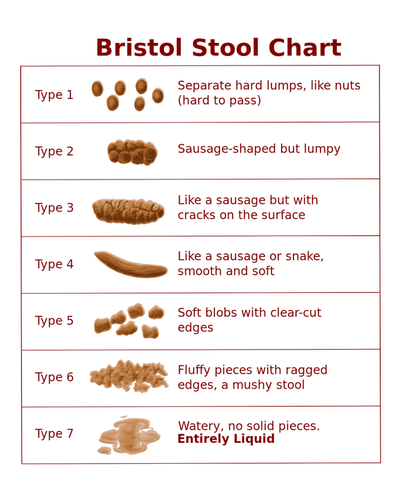 The Bristol Stool Chart is a commonly used visual to help people describe how their bowel movements look to their physicians. Here's the low-down: Type 4 is considered the "perfect poo" - soft, easy to pass, very few/no wiping needed. No cracks, or lumps, even in consistency and color. Type 1-3 equals varying degrees of constipation and dehydration. If we are dehydrated, our body will absorb water wherever it can. Given that our stool is mostly water, you can guess where our body gets some of that liquid. Gross. The longer stool stays in your colon, the more water gets reabsorbed, the drier it gets and more difficulty to pass. Type 5 is typical of people eating a mostly veggie based diet. Type 5-7 points towards malabsorption, food sensitivities or infection. If your stool is loose, runny or very frequent, it is likely that it is passing too quickly through the colon. Dehydration is also a concern as we can lose massive amounts of fluid via diarrhea. Eliminating foods that cause inflammation, treating infections or parasites, adding fibre, proper hydration and some botanicals to slow absorption can be very helpful in these cases.  If this looks a little more familiar to you, great, I'm all for everyone being on the same page. We may have also found out why you have IBS since processed foods like these often worsen IBS. If you or someone you know is experiencing Irritable Bowel Syndrome, please book a consultation with me to discuss your options. I have worked with many people experiencing a range of digestive issues using a blend of nutritional medicine, supplements, stress management techniques and acupuncture to help them experience lasting relief. 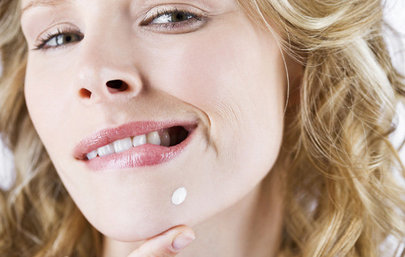 http://vipmobiledayspa.wordpress.com/2013/06/28/super-foods-that-fight-acne/ http://vipmobiledayspa.wordpress.com/2013/06/28/super-foods-that-fight-acne/ Ugh. 7 am. There's a bright red, angry monster that somehow took up residence on your chin overnight and is now staring back at you in the mirror. The beast hurts when you touch it. It is also probably giving you the stink-eye, just in time for your incredibly important interview. I've been there too. As a teen I had acne so bad it covered my face, chest and back. I went through years of antibiotic creams, washes, birth control pills that I never wanted, and Proactive facial care systems that stained all of my mother's towels. I was even on Accutane for two years. A high dose pharmaceutical variation on Vitamin A, Isotretinoin or Accutane, is commonly prescribed for severe cystic acne. While it is known teratogen (meaning that it is known to cause severe birth defects), a less common side effect of the drug is anxiety, depression and even suicidality. Fun times for me, when both me and my high school boyfriend were taking long courses of Accutane. It worked, however it was a pretty dark time and I'm lucky my family was so patient with me. It has since been taken off the market in Canada due to a possible link between use and Inflammatory Bowel Disease. Yikes! Acne vulgaris (the medical, even uglier sounding term) can be caused by a number of concerns, including: Hormonal imbalances - excess testosterone, or excess estrogen, PCOS, puberty, pregnancy/post-partum, menopause hormonal changes Food sensitivities - dairy, gluten, eggs are the most common although there are many other possible culprits, sugar, preservatives Digestive Weakness - low stomach acidity, excess protein (often from conventionally raised animals whose meat is pro-inflammatory and hormone-laden), poor gut flora, recent antibiotic use Medications - corticosteroids, oral contraceptives, anabolic steroids Allergies - cosmetics, chemicals, fragrances, clothing material, detergent Stress - lack of sleep, stress hormones in overdrive, less-than-scrupulous (or overly vigorous) hygiene But I'm not a teenager anymore! While it can be pretty devastating dealing with acne as a teen, most of us grow out of it. However, some people have acne lasting well into their 30's and 40's. Many others are suddenly faced with some angry crops of acne as adults. Several women I see with adult acne struggle to be taken seriously in their professional lives while feeling that that they look like a kid. Acne is not uncommon in the body-building world either, as anabolic steroids, sweaty work-out cloths and high amounts of whey protein powders can contribute to facial and b-acne. In these cases, look to food sensitivities and other environmental factors. Another form of adult acne, Rosaceae, is often related to low stomach acid or or food sensitivities. So what can I do for my adult acne? 1. Ditch the chemical laden products - Check out EWG's Skin Deep Cosmetic Database to determine if your cosmetics and personal care products could be contributing to your symptoms. Pay particular to expensive high-end brands - many of them have some particularly nasty ingredients. 2. Switch to raw honey as a facial cleanser. Full of good bacteria, honey acts as a skin normalizer for both oily and dry skin and promotes healing. 3. a) Limit sugar, dairy and processed foods. Low glycemic diet and acne (American Journal of Clinical Nutrition, 2007), Acne: the role of medical nutrition therapy (Journal of the Academy of Nutrition and Dietetics, 2013) b) Clean up your diet. Focus on lots of orange and yellow fruits and vegetables like carrots, winter squash, and pumpkin as they contain beta-carotene to help improve skin health. Leafy greens such as dandelion, beet greens, spinach, kale, chard, water cress, blue-green algae (spirulina, seaweeds) tonify the liver to help balance hormones. Mung beans, adzuki beans, unpeeled cucumber slices, alfalfa and soy sprouts are all used in Traditional Chinese Medicine for the treatment of acne as well. 4. Drink lots of water and green tea. Your kidneys and liver filter toxins out of your body - staying well hydrated assists this function. 5. Adopt a regular stress management practice. Acne is associated with lower self-esteem, higher and rates of depression - Understanding the burden of adult female acne (Journal of Aesthetic and Clinical Dermatology, 2014). Yoga, deep breathing, and exercise can be helpful for confidence breathing, handling stress and improving your quality of life. Check out Jean's story... this is a great example of how naturopathic medicine can help treat adult acne with amazing results! Naturopathic approaches to acne involve removing food sensitivities, creating a tailored supplement protocol, stress management exercises and hormonal support as needed to help resolve current acne, minimize scarring and reduce the occurrence of future outbreaks. If you are struggling with acne - whether you are a teen or a grandmother or anywhere in between - let's set up a time to chat. Here's to your clear skin! Dr. Keila 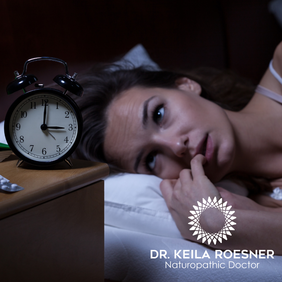
It was 2 pm and I was sitting in my first year physiology class at the Canadian College of Naturopathic Medicine.
I knew that it was important to stay awake but the more I tried to focus on my professor's words, I Just. Kept. Falling. Asleep. It felt so good, telling myself that I would just rest my eyes while listening to how the kidneys are supposed to work. Unfortunately I would wake with a gasp about every two minutes. I always blew my cover. I had told myself that I was just tired, that I didn't need to see anyone. I knew I didn't want the zombie pills that many of my family members were taking, you know, being a first year Naturopathic student and all. I needed help. That was the first time that I consulted a Naturopathic Doctor. Insomnia is one of the most common reasons for people to seek health care. Indeed, the vast majority of the patients I see have some sleep issues and are sometimes surprised to be told that they have insomnia. People with insomnia often have difficulty either falling or staying asleep, wake up too early and may feel un-refreshed in the morning. Insomniacs are also more likely to develop depression, anxiety, high blood pressure, heart disease, insulin resistance, diabetes, be overweight or obese, report substance abuse, have poorer cognitive performance and memory and take sick days from work. In other words, many of us are not sleeping and it is a problem. So what did I do? I learned the hard way. I know what it is like trying to function when you need to be at your best...and failing. I also learned that a few simple hacks can make all the difference. The Essentials for Good Sleep and Preventing Insomnia, Naturally:
If after implementing all of these measures consistently you are still having trouble sleeping, know that there are many options to help support you. As a Naturopathic Doctor, my role is to help identify the factors that may be contributing to your poor sleep, and helping you to create a treatment plan that is tailored to suit your lifestyle. I use a combination of therapies with great success to get my patients sleeping well. If you are interested in how I can help you, you are welcome to book a Health Discovery Session with me. I have helped many people, just like you, to get a good night's rest naturally. And me? I sleep like a baby now.
Are you overwhelmed trying to find a health care provider that "gets it"? Someone that is legit, not too woo-woo and who cares about you? You'll want to pay close attention if you are looking for a professional with a natural approach.
 Find a doctor that gets it. Find a doctor that gets it.
1. They should be licensed.
Look for somebody with an accredited degree. For example, seeing a Doctor of Naturopathic Medicine, Doctor of Chiropractic, Doctor of Osteopathy, Registered Massage Therapist, Licensed Acupuncturist etc. means that they have completed an undergraduate degree, followed by specialized post-graduate degree and standardized licensing exams. Although there are lots of great weekend courses out there, there is no substitute for a rigorous medical education when it comes to your health. 2. A good referral network and social media following. You want to know that you are in good hands. If friends or family members are having good results with a certain practitioner, ask who they are seeing. Most people are only too happy to recommend their go-to person. Likewise, check for social media involvement - a website that is frequently updated, blog, Facebook, Twitter, YouTube videos etc. etc. show that the practitioner is engaged with current health issues and welcomes patients who are ready to "do the work". A good practitioner also knows when it is time to refer you elsewhere. 3. Experience in treating your concerns... Ask if the practitioner has ever worked with someone who has similar concerns. If there is a positive track-record working with people also experiencing acne, migraines, hypertension, or anxiety (for example) the Naturopathic Doctor probably has tried several different approaches, and has a few favorite strategies in mind. 4. ..and willing to look outside the box for answers. We are all different. What worked for your neighbour's Irritable Bowel Syndrome may not work for you. You want to know that your naturopath won't throw in the towel if the tried-and-trues are not getting you the results that you want. 5. Someone with whom you feel comfortable expressing your concerns, thoughts and opinions. This is by far the most important of all. Regardless of the piece of paper on the office wall, the number of years in practice or how busy the waiting room, you want to feel comfortable. Your naturopath, chiropractor, massage therapist, or acupuncturist should want to know how you are experiencing your symptoms. You should never feel pressured into treatments that you are uncomfortable with or come home with hundreds of dollars in supplements that you don't why you're taking. You should feel free to be honest, express your concerns and get feedback. I have practiced Naturopathic Medicine and acupuncture in Stratford, ON since 2013, and previously at the RSNC, Sherbourne Health Centre and Anishnawbe Toronto. I am licensed with the College of Naturopaths, OAND and CAND. I love working with a wide variety of health conditions in children, teens, men and women have great results with lots of people just like you. My bottom line is that I treat people, not just their disease. If you are looking to improve your health and want the highest quality of care book a Health Doscvery Session to see how I can help you. Dr. Keila Roesner Your Stratford Naturopath |
Top 75 Naturopath Blogs & Websites For Naturopathic DoctorsAuthorDr. Keila Roesner is a Naturopathic Doctor. When not treating patients she is also an enthusiastic barefoot-strolling, music-loving, yoga-doing kitchen wiz - who also happens to be a wrestling fan. Categories
All
|
Let us take you from hormonal to whole.
|
Dr. Keila Roesner, BHSc ND
Naturopathic Doctor, Hormone Warrior and Your Wellness Cheerleader 247 Church Street, Stratford ON N5A 2R7 (519) 273-0900 [email protected] |
|









 RSS Feed
RSS Feed